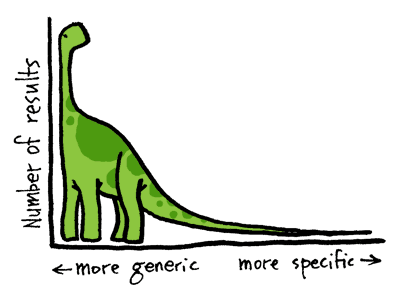There is no doubt that effective SEO keywords play a great role in today’s online market.
If there is a single concept that is the driver of much of the Internet’s growth over the past decade – not to mention nearly all of Google’s annual revenue of $25 billion – it is the concept of effective SEO keywords.
Keywords are what we type in when we are searching for products, services, and answers on the search engines, an act that Americans performed 15.5 billion times in April 2010 according to ComScore, the web research firm.
Today,
Google now processes over 40,000 search queries every second on average (visualise them here), which translates to over 3.5 billion searches per day and 1.2 trillion searches per year worldwide.
We teach SEO and other search engine strategy in our digital marketing course, you can check out our digital marketing course guide here.
Curious facts about Google search
- Google averages 60,000 search queries per second.
- Google processes 167 billion searches every month.
- Google processes more than 2 trillion searches per year worldwide.
- Google’s database contains 30 trillion unique URLs.
- Google’s search index is more than 100 million Gigabytes.
Companies optimise their web pages for search by assigning effective SEO keywords to those pages.
The implications for a business of picking the right and effective SEO keywords are therefore huge.
Get 50% Discount to Master ALL Aspects of Digital Marketing That Can Earn You $2,500 - $5,000 a month (Even if you are a complete beginner!)
Our students that intentionally implement what they learn from our digital marketing course make back the entire course fee within a single month or more after completing our course because our course gives them many income generating options with unlimited earning potential with no age or location barrier. The best part is no technical skills are required.
An opportunity to change your lifestyle and make money working from anywhere in the world. The results our students get from our digital marketing course prove this could be applied to any market or country and that it is designed for any skill level and work background.
*By signing up, you agree to our privacy policy and terms of service.
Highly-effective SEO keywords selection is fundamental to success when it comes to executing a paid search or PPC campaign. It is also integral to a website natural or organic ranking on the search engines.
But keywords are not just about SEO.
They at the heart of a company’s marketing campaign at its most granular level.
Here are some questions you need to ask yourself as a company trying to focus on getting organic traffic.
- Do our customers love our product because it is fast-acting or because it is long-lasting?
- Are we cheap or the best?
- Do we provide people with ideas or with help?
If you can’t immediately identify the most important keywords for your company, it is doubtful that you can effectively market your products and services to your target audience.
The following guide will provide you with 7 ideas to keep in mind when you are selecting effective SEO keywords on which to build your online marketing.
7 Secrets to Selecting Highly-Effective SEO Keywords
1. Focus on Good Phrases (Longtail keywords)

When it comes to search engine marketing, there may be no larger misnomer, no more archaic term than the ubiquitous keyword.
In my view,
There should be an official migration to the more accurate term key phrase.
But for now,
I will be forced to use what I consider to be an inaccurate term.
My frustration with this term is that it quite simply implies a single word, which is rarely the strategy that we employ when doing keyword research and selection in the service of PPC and SEO campaigns.
All too often, people dramatically overthink the most basic keyword research concepts; keyword generation should start simply with answering the question of “What products or services do you sell?”
If you sell dog food online, the root words dog and food alone would be very poor keywords because, on their own, neither dog nor food does a remotely good job at describing what you sell. Though this example makes it obvious, many times we have to fight through our urge to include those bigger, broader root keywords.
In this example, “the best long tail keyword should be, buy dog food online.”
Need help finding long-tail keywords for your niche or industry?
Try using the auto-suggestion feature of Google search. Just start typing in your first keyword and Google will auto-populate keywords based on popularity. Or you could find long-tail keyword ideas with tools like HitTail or WordTracker Keyword Tool.
2. Buyer Intent Keywords

Transactional searches are conducted by people who have already done their research and are ready to purchase.
In other words, this is your money maker category, or perhaps, search phrases with commercial value attached to them.
So if you don’t target keywords this group is searching, it’s probably a good idea to start.
Google’s Keyword Planner is a great tool to choose keywords to target this group of searchers. And you can use Google’s estimated cost per click to determine purchase intent, and the long-term value behind each click.
If you don’t have access to keyword planner, other tools like SEMrush, Ubersuggest and BuzzSumo are great options. And they can help you uncover the keywords people search when they are ready to purchase from your business.
Keywords Everywhere is another free tool that allows you to input keywords and see key metrics like search volume, cost per click, and competition level. This is extremely valuable because it allows you to determine the value of each keyword or phrase you target.
With Keywords Everywhere, you can bulk upload keywords and then export the information to help inform your content strategy.
3. Avoiding “Vanity” Keywords

Now let’s look at a trickier example—one where the root keyword arguably does a good job describing what we are selling.
Say I own an online jewellery store that sells all types of jewellery. To rank highly for the keyword jewellery would probably be at the top of my search engine marketing goals.
And yet this would probably not be a profitable keyword that will drive relevant traffic to my site.
That is because, from an organic SEO perspective, you are unlikely to rank highly for this term unless you are a huge, highly authoritative site—or lucky enough to be Jewelry.com, knowing that Google rewards keywords that match website addresses.
In this case,
You would do well to go after more specific keywords such as gold jewellery, silver necklace, or women’s Rolex watch.
Not only is the competition for these terms less fierce but, from both an SEO and a PPC perspective, those more specific keywords are going to have a significantly higher conversion rate to purchases on your site.
Sometimes we refer to those root keywords as “vanity keywords,” because if you do just one search to see who seems to be winning the space, you are likely to pick the single broadest keyword and see who comes up ranked highly.
In nearly every case, however…
We have found it to be more successful and deliver a significantly better return on your SEM investment by focusing on the hundreds or even thousands of more specific keywords that more closely match the services, products, brands, and locations that you sell or serve.
4. The Value of Repetition

One concern we hear frequently is whether it is beneficial or harmful to repeat keywords.
In other words, should we vary keywords (dog food, puppy food, and Purina) or repeat keywords (dog food reviews, dog food comparison, and dog food rankings.) The short answer is that the repetition is just fine, as long as the meaning of the phrase as a whole is sufficiently varied.
In other words,
Dog food and dog food online are basically synonymous, and the content that one might expect to find associated with both keywords is the same.
However,
Dog food reviews and dog food comparison indicate somewhat different content and therefore are appropriate to be used in tandem as keywords.
The more important concept to keep in mind is that you want to choose keywords that best relate to the content present on a web page and on a website; if you don’t have a dog food comparison matrix, then don’t bother including comparison-related keywords; you are misleading your users, and certainly not fooling Google.
So in an ideal world, you do have a comparison section, a reviews section, and a rankings section, housed on different pages or sections of your site, with each one tagged with the appropriate keywords.
Correspondingly, your SEO and PPC search engine marketing efforts should that content by driving review keywords to the review pages and so on.
5. Guiding Your Content Strategy

Keywords should guide your overall content strategy.
We have referred to this concept several times in the preceding tips, but it is important enough to leave as a final guiding paradigm.
Conventionally,
We think linearly about content and keywords; we build a website and then launch search engine marketing campaigns to drive users to our content.
That approach has its limits.
When we think about strategy at Digital Marketing Skill Institute, we think about a circular process; since our keyword research reflects both what users are seeking and the way that the search engines (particularly Google) “think” about keywords, we let that help to drive our content strategy.
Put differently, to be phenomenally successful, we seek not to take static content and try to pry greater results from it; instead, we leverage the existing needs of the users and use that knowledge to help us create the best possible user experience.
That, in turn, will be rewarded with higher rankings, greater traffic, and a higher ROI from our marketing efforts.
6. Scope out the competition

Running out of keyword ideas?
Size up the competition and see what they’re ranking for.
SEMRush allows you to enter a competitor and view the top keywords they’re ranking for organically. You can see the ranking keyword, their position in search results, traffic received and other helpful information.
Use this information to inform your own effective SEO keywords strategies.
Generate a list of 20-100 keywords that your competitors are ranking for. Decide whether you should compete for the same keywords or search for less competitive alternatives.
You may discover you’re missing out on key SEO ranking opportunities or keywords your competitors never even considered.
7. Relevancy is key

We see it all the time.
A company’s focus keywords don’t quite match up with the keywords their customers are searching for.
Your keywords should be relevant to your target audience. They should be the specific terms and phrases your prospects, leads and customers are typing into Google, Bing or any other search engine. If not, how will they find your website or blog when searching online?
How can you find out what keywords your target audience is searching for?
By monitoring social news feeds and Google Trends, you can uncover a wealth of insights on trending topics and user behaviour.
You can dig even deeper and conduct in-depth keyword research with Google’s Keyword Planner tool. This free tool gives you the monthly search volume for any given keyword. Build out a short list of terms you think your customers are using and then see if you were right by plugging them into this tool.
Other keyword research tools include Moz’s Keyword Explorer, Ubersuggest, Keyword Tool and so on.
Before deciding on any one tool for you and your business, test out different ones and ask around for recommendations.
The goal of all this research is to unearth high-volume, low-competition keywords that make the most sense for your SEO strategy. Always keep your buyer personas and their pain points, challenges and other defining characteristics in mind. Would they use this exact verbiage when seeking more information or another phrase instead?
Always keep your buyer personas and their pain points, challenges and other defining characteristics in mind. Would they use this exact verbiage when seeking more information or another phrase instead?
To sum it up:
I believe that if you implement these 7 effective SEO keywords ideas to your content optimization strategy, your contents will get quicker and higher ranking on google search results.


